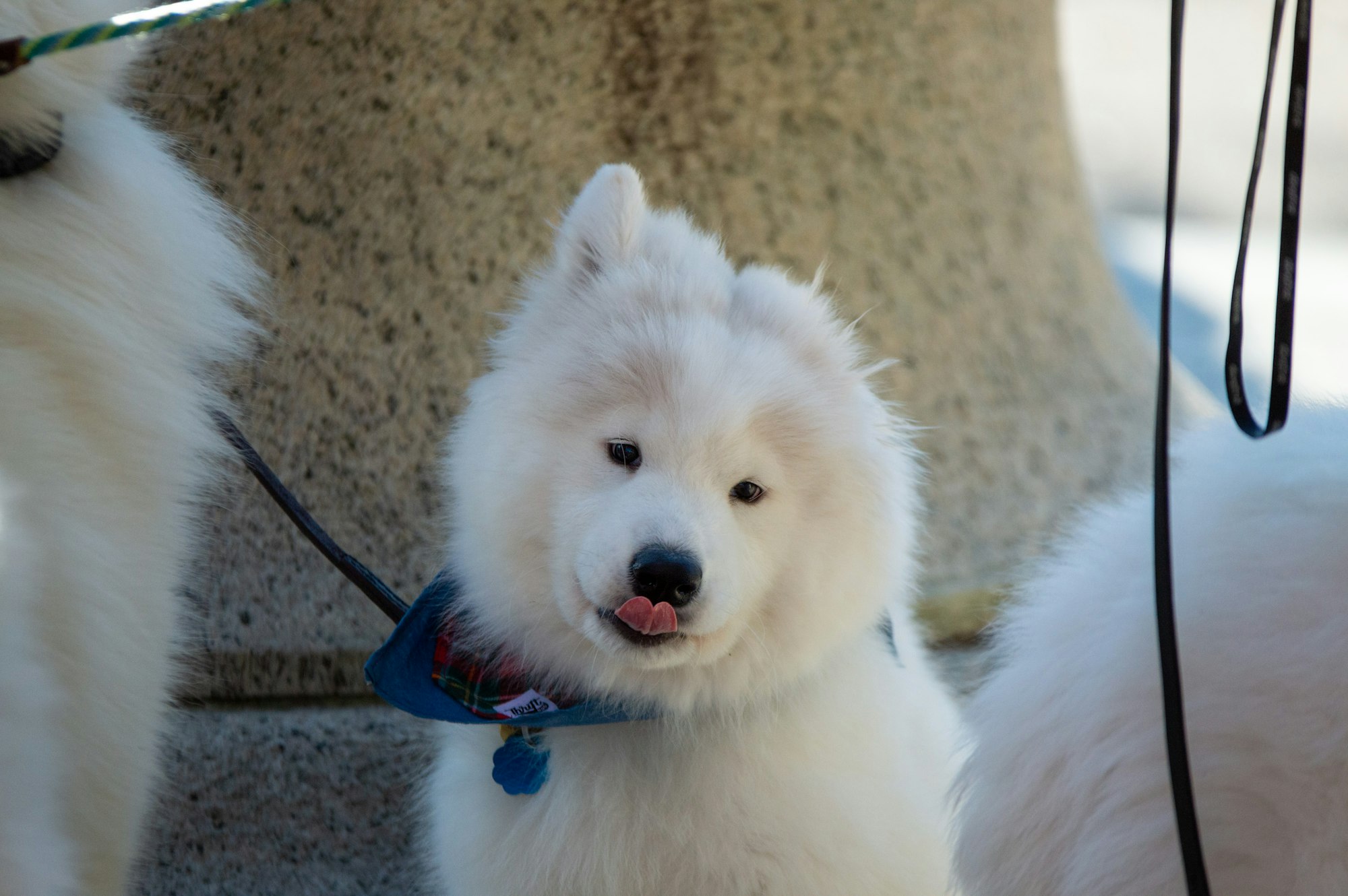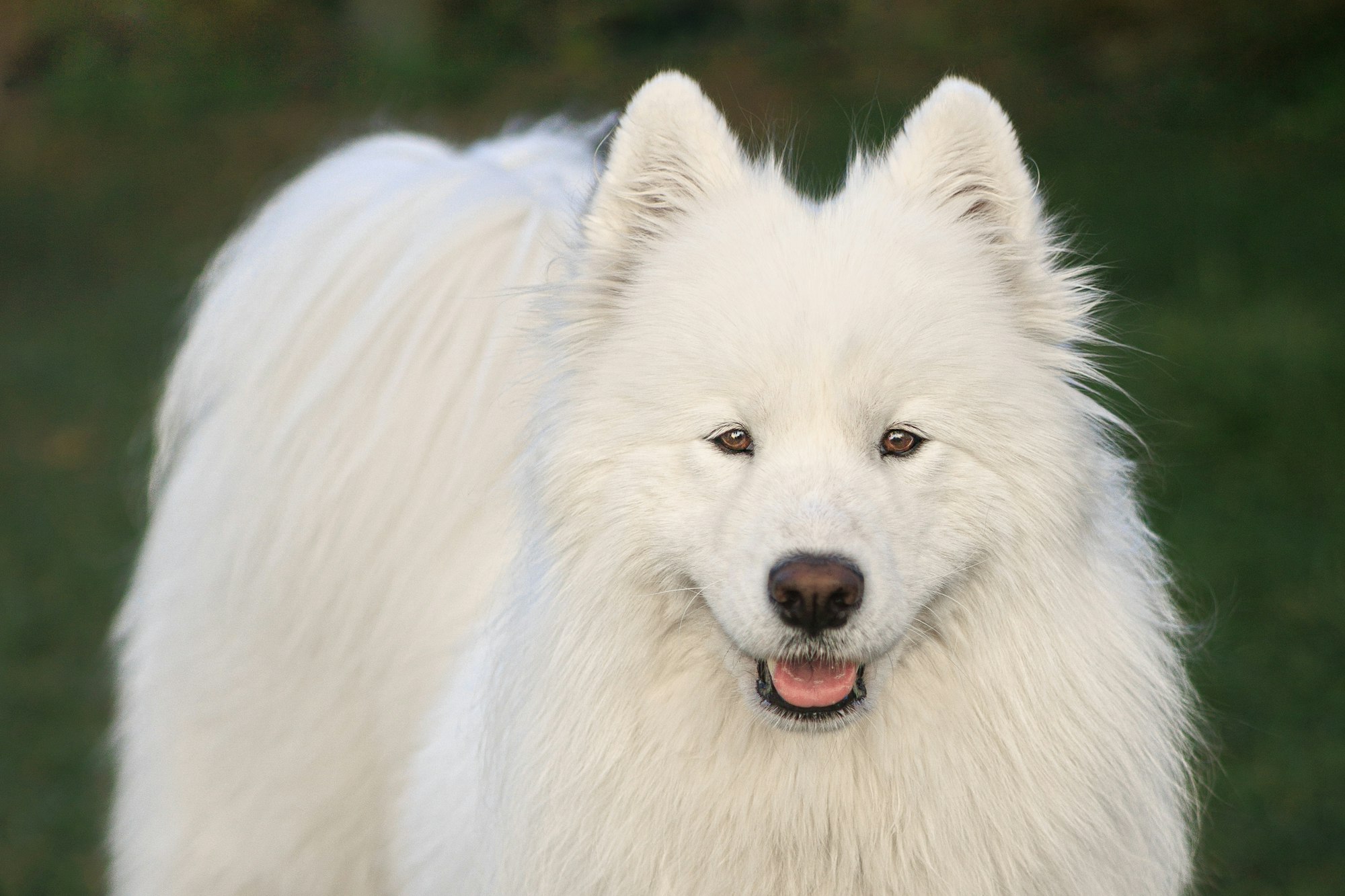Have you ever looked into the sparkling eyes of a Samoyed and wondered, "Are Samoyeds aggressive?" It's a question that often surfaces amongst dog enthusiasts and potential pet owners. This fluffy, smiling breed, known for its gentle demeanor, is an enigma wrapped in white fur. Let's unravel this mystery together and truly understand the temperament of these beautiful dogs.
The Nature of Samoyeds
Samoyeds, with their cloud-like fur and ever-present 'Sammy smile,' are often the center of attention. But behind that smile lies a temperament shaped by centuries of breeding. Originally used for herding reindeer and pulling sleds, Samoyeds are hardworking and have a strong pack mentality. This history informs much of their behavior.
Are They Aggressive?
To answer the burning question: "Are Samoyeds aggressive?" - typically, no. Samoyeds are known more for their friendly and sociable nature. They thrive on human companionship and are often very gentle with children. However, like any breed, individual personalities and behaviors can vary.
Understanding Samoyed Behavior
Understanding Samoyed behavior is key to interpreting their actions. They are intelligent and expressive dogs, often communicating through a range of vocalizations and body language. This breed is not typically aggressive but can be quite vocal, sometimes mistaken for hostility.
Training and Socialization
Key to managing a Samoyed's temperament is early training and socialization. Samoyeds are quick learners but can be a bit stubborn. Consistent, positive reinforcement training works best. Socializing them from a young age with various people, animals, and environments helps in developing a well-rounded character.
Dealing with Potential Aggression
If a Samoyed shows signs of aggression, it's often rooted in anxiety, fear, or inadequate socialization. It's crucial to address these issues early with the help of a professional trainer or behaviorist.

Samoyed Dog Personality
Delving into the Samoyed dog personality, you'll find they are playful, affectionate, and love being part of the family. They are not a breed that does well with long periods of isolation. Their sociable nature means they prefer being involved in family activities.
In conclusion, while Samoyeds are not typically aggressive, understanding their temperament is key to a harmonious relationship. These dogs, with their rich history and expressive nature, make wonderful, loving pets. They require understanding, training, and companionship to truly thrive. So, the next time you see a Samoyed, remember, behind that 'Sammy smile' is a story of heritage, loyalty, and a deep need for love and belonging.
The Importance of Exercise and Mental Stimulation
Continuing our journey into the heart of the Samoyed temperament, we must not overlook the importance of exercise and mental stimulation. These energetic dogs were bred for work, and their energy levels reflect this heritage. Regular exercise is not just a preference; it's a necessity for a Samoyed. A bored Samoyed can develop destructive behaviors, which are often mistaken for aggression.
Samoyed Breed Information - Beyond Temperament
While discussing "Are Samoyeds aggressive?", it's equally important to understand other aspects of their breed information. Their thick, white coat requires regular grooming to prevent matting and maintain their stunning appearance. Also, being pack animals, they crave leadership. Establishing yourself as a calm and assertive leader helps in managing their behavior effectively.
Friendly Dog Breeds - Where Samoyeds Stand
In the broader context of friendly dog breeds, Samoyeds often stand out. Their approachability, combined with their fondness for human interaction, makes them excellent companions. They are typically very welcoming to strangers, which makes them less suitable as guard dogs but great as family pets.
Samoyed Aggression Signs - What to Look Out For
Understanding the signs of aggression in Samoyeds is crucial for early intervention. While rare, signs like excessive growling, snapping, or unprovoked aggression towards people or other animals can be cause for concern. It's essential to understand that these signs often stem from fear, discomfort, or lack of training, rather than inherent aggression.
Dealing with Aggressive Dogs - A Samoyed Perspective
When dealing with a Samoyed showing aggressive tendencies, patience and understanding are key. It's vital to identify the root cause of the behavior. Consultation with a professional dog behaviorist is often beneficial. They can provide strategies tailored to your Samoyed's specific needs, ensuring a positive outcome for both the dog and the owner.
The Role of Environment in Shaping Temperament
The environment plays a significant role in shaping the temperament of a Samoyed. A loving, stable home where the Samoyed feels secure and part of the family can prevent many behavioral issues. Conversely, neglect or a stressful environment can contribute to anxiety and potentially aggressive behavior.
Samoyed Personality Traits - A Comprehensive View
In understanding Samoyed personality traits, one finds a blend of intelligence, playfulness, and affection. They are known for their alertness and curiosity, often showing a mischievous side. Their loyalty to their family is unmatched, and they often form strong bonds with their owners. This breed's personality is multifaceted, combining the joy and playfulness of a companion dog with the seriousness and diligence of a working breed.

Understanding the Samoyed Breed
The question "Are Samoyeds aggressive?" often arises among potential dog owners. In reality, Samoyeds are known for their gentle, friendly nature. This article delves deep into their temperament, training needs, and family dynamics, providing a comprehensive understanding of this beautiful breed.
Samoyed Temperament: Gentle and Friendly
Samoyeds are not typically aggressive. Their temperament is characterized by:
- Affectionate Nature: Known for their loving and warm disposition.
- Social Tendencies: They enjoy being around people and other animals.
- Intelligence: Samoyeds are smart and respond well to training.
Integrating Samoyeds into Family Life
Samoyeds are excellent family pets:
- Child-Friendly: They are known for being gentle and patient with children.
- Attention-Seeking: This breed loves to be involved in family activities.
- Pack Animals: They view their family as their pack and strive to be an active part of it.
Effective Training Strategies for Samoyeds
Proper training is essential for a well-behaved Samoyed:
- Early Training: Start training your Samoyed as early as possible.
- Consistency: Use consistent commands to avoid confusion.
- Positive Reinforcement: Reward good behavior with treats and praise.
- Regular Socialization: Expose them to various environments and situations.
Health and Grooming Needs of Samoyeds
Paying attention to health and grooming is crucial:
- Regular Grooming: Their thick coat requires frequent brushing.
- Exercise: They need daily physical activity to stay fit and happy.
- Breed-Specific Health Issues: Be aware of and monitor for common health problems in Samoyeds.

The Delight of Owning a Samoyed
Samoyeds bring immense joy and companionship:
- Loving Companions: Their affectionate nature makes them great companions.
- Playful and Energetic: They often display a playful, spirited personality.
- Loyal Friends: Samoyeds are known for their loyalty to their family.
Building a Strong Bond with Your Samoyed
Creating a deep connection with a Samoyed hinges on understanding and meeting their emotional and physical needs. Spending quality time together, engaging in activities like walks and playtime, and being attentive to their communication cues are vital. A Samoyed thrives in a stable, loving environment where they feel part of the family.
Managing a Samoyed’s Energy Levels
Samoyeds are naturally high-energy dogs, and managing this aspect of their temperament is crucial for their wellbeing. Regular physical exercise such as daily walks, runs, or play sessions is essential. Engaging them in interactive games and mental stimulation activities also helps in channeling their energy positively.
The Importance of Routine for Samoyeds
Samoyeds benefit greatly from a structured routine. Consistent feeding times, exercise schedules, and training sessions provide them with a sense of security and order. This consistency helps in reinforcing good behavior and creates a predictable environment, which is comforting for the breed.
Samoyed and Other Pets: Fostering Harmonious Relationships
Samoyeds generally get along well with other pets, especially when introduced properly and socialized from a young age. Encouraging positive interactions and monitoring their play can foster harmonious relationships between your Samoyed and other household pets.
Nurturing the Samoyed's Social Skills
The social nature of Samoyeds cannot be overstated. Their friendly demeanor towards humans and other animals alike makes them ideal family pets. To nurture this aspect of their personality, regular socialization is key. Introducing your Samoyed to a variety of people, environments, and other animals in a controlled and positive manner helps in developing their confidence and maintaining their gentle nature.
The Role of Nutrition in a Samoyed’s Health
The health and temperament of a Samoyed are significantly influenced by their diet. A balanced, nutritious diet is essential for maintaining their energy levels, coat health, and overall wellbeing. Consulting with a veterinarian to determine the best diet plan for your Samoyed, taking into account their age, activity level, and any specific health concerns, is advisable.
Understanding and Responding to Samoyed Behavior
It's important for Samoyed owners to learn to read and respond appropriately to their dog’s behavior. Recognizing signs of discomfort, stress, or excitement allows for timely and appropriate responses. Training that focuses on positive reinforcement and understanding canine communication helps in building a strong and respectful relationship between you and your Samoyed.
The Lifelong Commitment to a Samoyed
Owning a Samoyed is a long-term commitment that requires time, effort, and love. They are not just pets but become integral members of the family. As they age, their needs may change, and it’s important to adapt to these changes to ensure their continued health and happiness.
Celebrating the Unique Charm of Samoyeds
The unique charm of Samoyeds lies not just in their stunning appearance, but also in their joyful and spirited personality. They are known for their 'Sammy smile,' a heartwarming expression that reflects their friendly and welcoming nature. Celebrating this charm involves embracing their playful antics and enjoying the warmth and happiness they bring into our lives.
Preparing for a Samoyed: What Potential Owners Should Know
For potential Samoyed owners, preparation is key. Understanding the breed’s requirements in terms of space, exercise, and companionship is crucial. Prospective owners should be ready to invest time in training, grooming, and social activities, ensuring their Samoyed grows into a well-adjusted and happy dog.
The Samoyed Community: Support and Resources
Joining a community of Samoyed owners can be incredibly beneficial. Such communities offer support, share resources, and provide valuable advice on everything from health care to training tips. Participating in forums, local clubs, or social media groups dedicated to Samoyeds is a great way to connect with experienced owners and learn more about the breed.

The Lasting Impact of a Samoyed in Your Life
The impact of a Samoyed in one's life is profound and lasting. These dogs are not just pets; they become loyal friends, cherished companions, and integral family members. The bond formed with a Samoyed is deep, filled with moments of joy, companionship, and unconditional love. They teach us about patience, empathy, and the pure joy of living in the moment.
Conclusion
In conclusion, the question "Are Samoyeds aggressive?" reveals a breed characterized by affection, intelligence, and a friendly demeanor. Proper training, socialization, and understanding their high-energy nature are key to a harmonious relationship with these gentle dogs. They thrive in loving family environments, requiring regular exercise, grooming, and attention.
Samoyeds are excellent companions for children and other pets, benefiting from a structured routine and a balanced diet. Owning a Samoyed is a long-term commitment that brings immense joy and companionship, making them much more than just pets – they are loyal, playful, and integral family members.
FAQs
- Are Samoyeds naturally aggressive?
No, Samoyeds are not naturally aggressive. They are known for their friendly and affectionate nature. Proper socialization and training are crucial to maintain their gentle demeanor. - How important is exercise for a Samoyed?
Exercise is vital for Samoyeds due to their high energy levels. Regular physical activities like walking, running, or playing are essential to keep them healthy and happy. - Can Samoyeds live comfortably with children and other pets?
Yes, Samoyeds generally do well with children and other pets, especially when socialized from a young age. Their gentle and playful nature makes them great family pets. - What are some common health concerns for Samoyeds?
Common health concerns for Samoyeds include hip dysplasia, eye problems, and skin issues. Regular veterinary check-ups and a balanced diet are important for their health. - How much grooming do Samoyeds require?
Samoyeds require regular grooming due to their thick, fluffy coats. Frequent brushing is necessary to prevent matting and to maintain coat health. - Is training a Samoyed difficult?
While Samoyeds are intelligent and capable of learning quickly, they can sometimes be stubborn. Consistency, patience, and positive reinforcement techniques are key in training them effectively. - What should potential Samoyed owners consider before getting one?
Potential Samoyed owners should consider the breed's need for regular exercise, grooming, and companionship. Understanding their temperament and energy levels is crucial to ensure a good fit for family life.